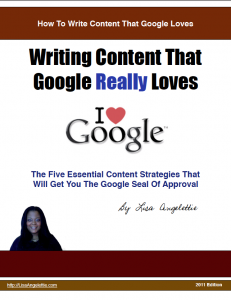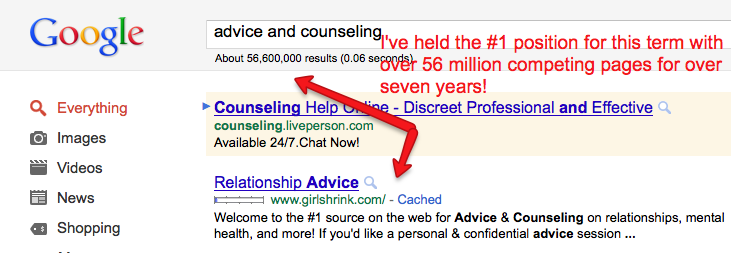Getting Into The Google Mindset
It is no secret that writing high quality articles is my #1 traffic generator and list building strategy for ALL of my websites. In fact, writing good articles is an advantage that many coaches and consultants have because many of us are “natural writers“. We have a message and we want to help people with some sort of problem, so we have a lot of content already spilling out of us. We’ve just got to get it all down and spread to prospects in a BIG way. One of the best ways I have found to get my message out to thousands of people is by taking advantage of the search engine powerhouse Google.
Google has been sending me oodles of free traffic to my main and niche websites for many years. In fact, I have held the #1 position for over a 100 of my keywords for over seven years! That’s seven years of Google updates and Google slaps. Seven years of the ups and downs of marketing trends. And the reason why my #1 positions have never waivered is because I have always chosen to have the Google mindset when writing my articles.
For me, the Google mindset means to write my articles with my readers needs #1 and the search engine’s criteria #2. That’s really what Google honchos want from us as webmasters and that should be what we want for our businesses too. First, we need to serve our clients. And then we need to make sure that we can do it in a BIG way, so that means we should write using good search engine etiquette.
So What Is The Google Mindset?
Not too long ago there was an article published on the Google webmaster site about how Google identifies a high quality article and a high quality site. While they were not going to reveal their secret algorithms for ranking content, they did give webmasters a LOT of insight on the questions that they ask when they evaluate a piece of content (and how we should evaluate our own content as well). Here they are:
1. Would you trust the information presented in this article?
2. Is this article written by an expert or enthusiast who knows the topic well, or is it more shallow in nature?
3. Does the site have duplicate, overlapping, or redundant articles on the same or similar topics with slightly different keyword variations?
4. Would you be comfortable giving your credit card information to this site?
5. Does this article have spelling, stylistic, or factual errors?
6. Are the topics driven by genuine interests of readers of the site, or does the site generate content by attempting to guess what might rank well in search engines?
7. Does the article provide original content or information, original reporting, original research, or original analysis?
8. Does the page provide substantial value when compared to other pages in search results?
9. How much quality control is done on content?
10. Does the article describe both sides of a story?
11. Is the site a recognized authority on its topic?
12. Is the content mass-produced by or outsourced to a large number of creators, or spread across a large network of sites, so that individual pages or sites don’t get as much attention or care?
13. Was the article edited well, or does it appear sloppy or hastily produced?
14. For a health related query, would you trust information from this site?
15. Would you recognize this site as an authoritative source when mentioned by name?
16. Does this article provide a complete or comprehensive description of the topic?
17. Does this article contain insightful analysis or interesting information that is beyond obvious?
18. Is this the sort of page you’d want to bookmark, share with a friend, or recommend?
19. Does this article have an excessive amount of ads that distract from or interfere with the main content?
20. Would you expect to see this article in a printed magazine, encyclopedia or book?
21. Are the articles short, unsubstantial, or otherwise lacking in helpful specifics?
22. Are the pages produced with great care and attention to detail vs. less attention to detail?
23. Would users complain when they see pages from this site?
Why Getting Into The Google Mindset Is Critical Right Now
If you hadn’t heard, Google has been implementing Google Panda which is a long-term algorithmic shift that has involved several updates. The first update, Panda 1.0, rolled out in February and has been followed by several more, all of which have affected a growing number of sites. The updates, as of this writing, include:
Panda 2.4 on August 12th.
Panda 2.3 on July 27th or so.
Panda 2.2 on June 18th or so.
Panda 2.1 on May 9th or so.
Panda 2.0 on April 11th or so.
Panda 1.0 on February 24th
It is more important than ever to get into the Google mindset for writing high-quality articles and content for two reasons. One — you don’t want these updates to affect your site, your articles, and their ranking. You want to stay where you are or rank even higher for your keyword terms. Two — you want to be ready to step into the place of some of your competitors who were affected by this update or who will be very shortly. As some of your competitiors fall in the rankings for certain terms, that leaves room for entrepreneurs with the Google Mindset to step up and take your rightful position of #1 !
 If you’re ready to learn more about the Google Mindset and how to write articles that Google loves for more guaranteed search engine traffic and #1 Google positions, go to: Writing Articles That Google Loves! to download my special report with bonus step by step checklist where I spell it all out for you in easy, simple, steps.
If you’re ready to learn more about the Google Mindset and how to write articles that Google loves for more guaranteed search engine traffic and #1 Google positions, go to: Writing Articles That Google Loves! to download my special report with bonus step by step checklist where I spell it all out for you in easy, simple, steps.
In less than 30 minutes you’ll be a Google ninja!
Lisa Angelettie
Latest posts by Lisa Angelettie (see all)
- Back Matter 101: How To Add Killer Call To Actions To Your Books - August 3, 2015
- Shelfari Is No Longer An Option In Author Central - July 28, 2015
- What Are The Most Well-Read Cities In America? - June 2, 2015

… [Trackback]
[…] Read More on on that Topic: lisaangelettieblog.com/getting-into-the-google-mindset/ […]